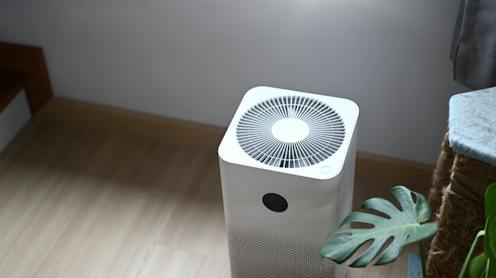
Prathankarnpap/Shutterstock
The COVID pandemic led to many calls for improved indoor air quality with claims that doing so would reduce the risk of the virus spreading. But the real-world evidence to support these claims has been lacking and studies undertaken during the pandemic have not yet been reported.
So my colleagues and I reviewed the evidence before COVID and found that the balance of evidence was that air treatment does not, in fact, reduce illness from respiratory infections.
There are two main types of air treatment devices: filters and air disinfectors. Filters work by removing particles from the air that may contain infectious virus. Air disinfectors use ultraviolet radiation or ozone to inactivate viruses in the air.
In our systematic review we found 32 observational and experimental studies on the topic, conducted between 1970 and 2022. Overall, the evidence was that these technologies did not reduce either the frequency of illness or its severity.
When looking at the laboratory-confirmed influenza or norovirus infections, there was an apparent trend towards fewer infections. However, there was evidence of strong publication bias – which is where significantly positive results are more likely to get published than negative results.
Publication bias makes the apparent impact of any intervention or treatment appear stronger than it is as those negative studies are simply not published.
Our review concluded that there is no strong evidence that air treatment technologies reduce the risks of respiratory transmitted illnesses.
None of the studies included in the review was directly about COVID, as none had been published during the study period.
However, a recent German study (published in July), did investigate the effect of high-efficiency particulate air (Hepa) filters on COVID in kindergartens. The researchers compared illness rates in schools that had new filters installed with those that did not.
They found that there was no significant difference between the two. Indeed, infection rates were slightly higher in children in those schools that had the filters installed.
What about ventilation?
This study did not consider research on the effect of ventilation, such as keeping windows open, on the risk of illness. One possible issue with the studies of air treatment is that ventilation rates may have been reduced, thereby increasing risk.
There has been a recent systematic review of the effect of ventilation on COVID infection. Although there was a bit more evidence in support of ventilation reducing infection, the studies were all of poor or very poor quality. As a result, the researchers concluded that the “level of confidence ascribed to this conclusion is low”.
So differences in ventilation are unlikely to explain the negative findings in the air treatment studies.

S Photo/Shutterstock
If air treatment does not reduce the risk of illness, why may that be the case? I would argue that there are several reasons air treatment technologies were never going to be the panacea that some were claiming.
First, the risk of transmission of respiratory viruses depends on how close you are to an infected person. Early in the pandemic one group of scientists showed that the risk of infection dropped considerably the further someone got from an infectious person.
Someone who got within one metre of an infectious person was about five times at greater risk than someone who stayed more than one metre away. It is doubtful that air treatment would affect such close person-to-person transmission.
Second, even if air treatment was effective at preventing infection within a particular indoor space, people move regularly between spaces. Air treatment in your school or workplace will not protect you while on public transport or when gathering in other environments.
Finally, there is the issue of epidemic dynamics of infections that have a short duration of immunity. As I discussed over two years ago, infections like COVID that have a relatively short duration of immunity behave differently than would be predicted by standard epidemic models because people can be reinfected many times during their life as their immunity wanes.
Infections like COVID are better modelled by the SEIRS (susceptible, exposed, infected, recovered, susceptible) model. In this model, interventions like air filtration or wearing masks become less effective as most infections become reinfections. What then drives infection rates is the rate at which people lose their immunity.
So the balance of real-world evidence is that air treatment technologies do not reduce the risk of becoming ill from a respiratory infection like COVID. There is a little more evidence that increased ventilation may reduce that risk, but the evidence is far from compelling.
![]()
Paul Hunter consults for the World Health Organization. He receives funding from National Institute for Health Research, the World Health Organization and the European Regional Development Fund.





























